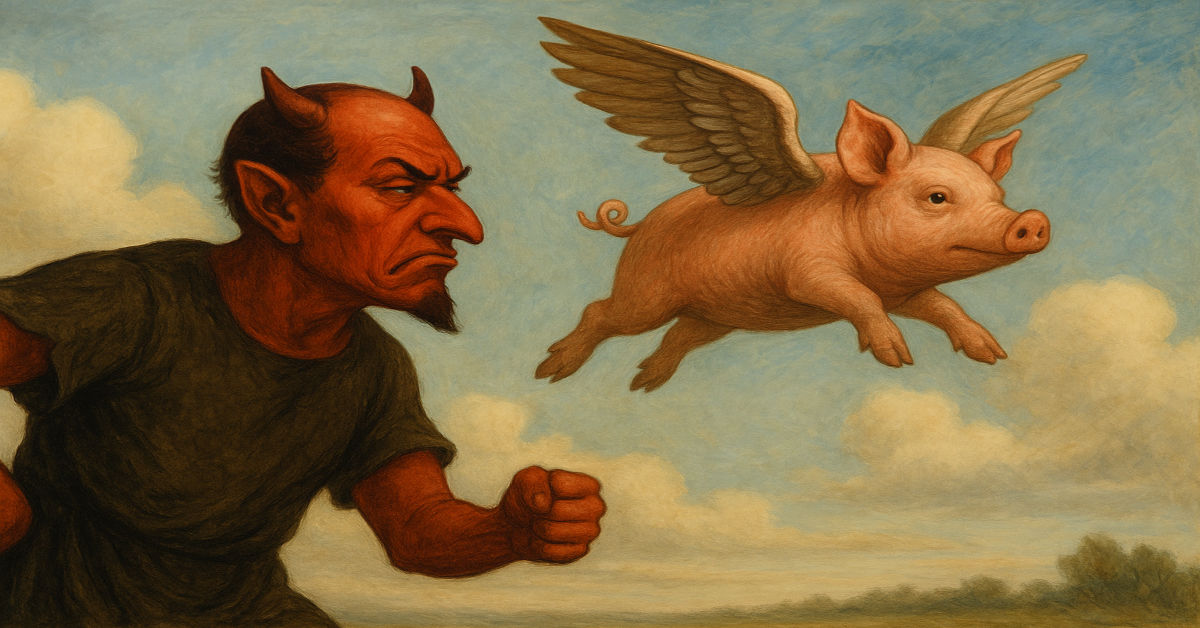Language is a living entity. It shifts, morphs, and sometimes ties itself in delightful knots. One such linguistic curiosity is the phrase: “the devil is an ass when pigs fly” At first glance, it reads like something out of a surreal comedy or a whimsical fantasy. But beneath its absurd exterior lies a fascinating reflection on human belief, sarcasm, and societal values.
In this article, we’ll delve into the roots, meanings, and cultural relevance of this unusual phrase. From Elizabethan theatre to modern memes, we’ll track its path and explain why this saying still matters in today’s world.
What Does the Phrase Actually Mean?
To break it down:
- “The devil is an ass” is a phrase that first appeared in the 17th century, most notably in Ben Jonson’s 1616 satirical play The Devil is an Ass. In this context, it implies that Satan himself is foolish, especially when compared to human cunning and folly.
- “When pigs fly” is a well-known idiom used to describe something that will never happen — a humorous way of expressing impossibility.
When merged, “the devil is an ass when pigs fly” intensifies the idea of absurdity. It could be interpreted as a way of saying, “Only in the most ridiculous, impossible circumstances would someone be this foolish.”
It’s a sarcastic, layered expression with a pinch of the fantastical — a perfect specimen of English’s flair for figurative speech.
A Brief Dive into the Origins
Let’s start with the first half: “The devil is an ass.”
This comes directly from Ben Jonson’s satirical play of the same name. In it, Jonson pokes fun at the devil and presents a minor demon, Pug, who comes to Earth hoping to corrupt humans, only to find them already quite proficient at corrupting themselves. The irony is clear: the devil is too naïve and foolish to compete with human vice.
Jonson’s work, drenched in satire, reflects a broader Elizabethan skepticism — a commentary on how society often blames supernatural forces for its own misdeeds. His devil is not a terrifying figure, but a bumbling, comical one.
The second half — “when pigs fly” — dates back to at least the 1600s, and perhaps even earlier in Scottish literature. Pigs, being land animals and poor candidates for aviation, were used as a metaphor for the impossible.
Over time, these two phrases — one historical, one idiomatic — have merged in modern colloquialism, likely for humorous exaggeration.
Cultural and Literary Significance
1. Human Folly and Satire
The phrase holds a mirror to society. By calling the devil an “ass,” we mock not just evil, but the idea that it’s otherworldly. It’s a statement that people often don’t need a devil to make bad decisions; they’re perfectly capable of doing so on their own.
This critique is echoed in many works of satire across centuries. From Jonson to Twain to contemporary stand-up comedians, mocking the devil often serves as a way to highlight human absurdity.
2. Modern Usage and Internet Culture
Though it may not be a phrase you hear every day, fragments like “the devil is an ass” or “when pigs fly” are alive and well in digital communication. The internet thrives on sarcasm and hyperbole — tools that this phrase delivers in spades.
Memes often combine impossible scenarios with exaggerated characters. For instance, using the devil in a TikTok video or comic strip as a clueless figure baffled by human behavior fits perfectly within the satirical framework Jonson created centuries ago.
In essence, this phrase has found new life in the 21st century as a shorthand for criticizing foolishness in an entertaining way.
3. Linguistic Playfulness
English speakers have a long-standing tradition of twisting language to express nuanced emotions, especially frustration or disbelief. This phrase combines religious imagery, farmyard absurdity, and Elizabethan satire into a single package. That’s linguistic gold.
Whether it’s used in a tweet, a blog post, or a pub conversation, it serves the same purpose: to express that something or someone is so ridiculous, it borders on surreal.
Why This Phrase Resonates Today
We live in a time where satire and sarcasm are key cultural currencies. Political debates, social media commentary, and even advertising use irony to connect with their audiences.
In this context, saying “the devil is an ass when pigs fly” taps into:
- Frustration with hypocrisy – Especially when people or institutions act in obviously flawed ways while claiming moral high ground.
- Recognition of the absurd – In a world where reality often feels stranger than fiction, using absurd phrases to describe events feels oddly accurate.
- Desire for humor amidst chaos – Combining humor with critique allows for a form of catharsis. Laughing at the idea of a foolish devil while highlighting the madness of a real-world situation is both clever and comforting.
Historical Context: How the Devil Changed
The devil hasn’t always been a figure of fear. Throughout history, especially in literature and art, he has often been portrayed as a jester, a trickster, or even a victim of human wickedness.
From Goethe’s Faust to The Screwtape Letters by C.S. Lewis, the devil morphs depending on the societal attitudes of the time. In Jonson’s era, portraying Satan as a fool allowed playwrights to criticize the Church, monarchs, and society without outright heresy.
Today, the same trope lets us question modern institutions and figures of authority — not through anger, but through laughter.
Cross-Cultural Parallels
While this exact phrase is rooted in English literature, similar sentiments appear in other cultures:
- In French, “Quand les poules auront des dents” (“when hens have teeth”) is used to express impossibility.
- In Spanish, “Cuando las ranas críen pelo” (“when frogs grow hair”) serves a similar function.
- In Chinese, “太阳从西边出来” (“when the sun rises in the west”) implies something will never happen.
These examples show that absurd imagery is a global way to express disbelief, with animals often acting as the metaphorical vehicle.
Modern Interpretations in Pop Culture
From animated shows to political cartoons, satirizing evil as incompetence is now a storytelling staple. Consider:
- “The Good Place” – A TV series that explores ethics and the afterlife with a devil-like character who is often hilariously inept.
- “South Park” and “The Simpsons” – Frequently use the devil as a comic device, challenging traditional notions of morality.
- Internet memes – Often feature devilish characters reacting to human foolishness with disbelief or mockery.
These portrayals continue the legacy of “the devil is an ass” — reducing fear through ridicule.
Conclusion
At first glance, “the devil is an ass when pigs fly” seems like nonsense — a whimsical mishmash of idioms. But dig deeper, and you uncover a rich history of satire, skepticism, and cultural commentary. From Ben Jonson’s London stage to today’s digital platforms, this phrase endures because it captures something timeless: our need to laugh at the world’s absurdity and call out foolishness without losing our sense of humor.
So, the next time someone makes a wildly naive claim or expects the impossible, you’ll know exactly what to say — and why it matters.
FAQs
1. Where did the phrase “the devil is an ass” originate?
It originates from a 1616 satirical play by English playwright Ben Jonson titled The Devil is an Ass. The play uses humor to depict the devil as less clever than humans, flipping traditional notions of evil.
2. What does “when pigs fly” mean?
It’s an idiom used to describe something that will never happen — a humorous or sarcastic way of expressing impossibility.
3. Is the full phrase “the devil is an ass when pigs fly” commonly used?
While it’s not commonly used in daily speech, it appears in literature, satire, and modern media as a humorous exaggeration combining two well-known idioms.
4. What is the significance of using animals like pigs in idioms?
Animals are often used in idioms to symbolize traits or impossibilities because they evoke vivid imagery. Pigs, in particular, are grounded animals, so imagining them flying creates an absurd mental picture that highlights the phrase’s message.
5. How can I use this phrase effectively?
Use it when you’re trying to highlight absurdity or criticize foolishness in a humorous way. For example: “Oh, you think the company will lower prices voluntarily? The devil is an ass when pigs fly!”











